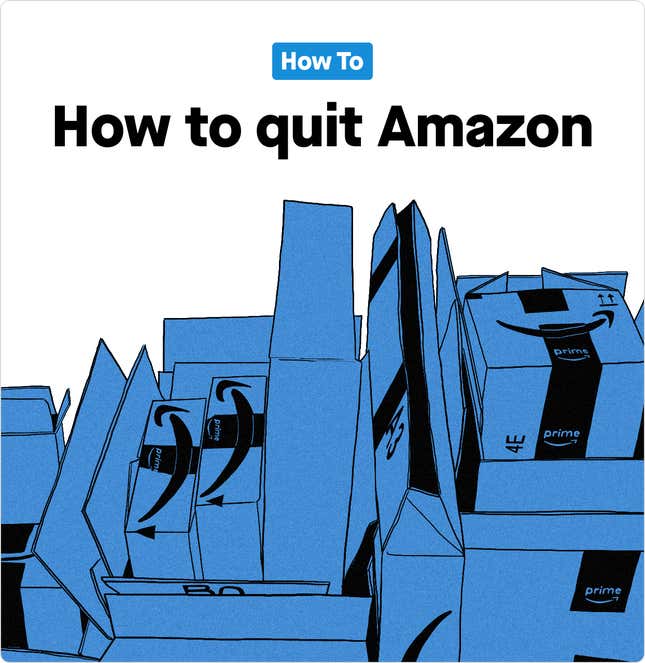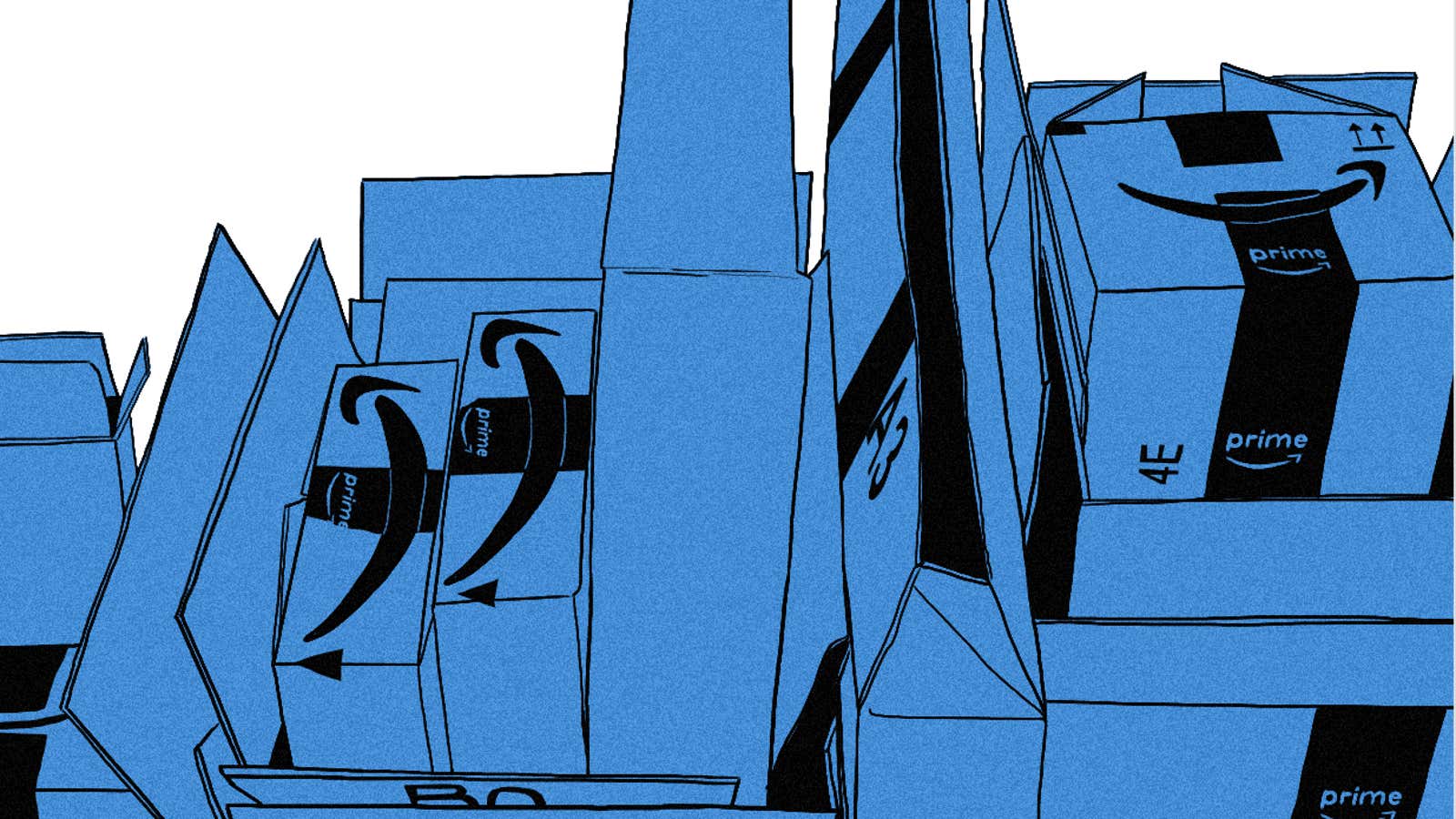
Hi Quartz members,
As we get into the big shopping season, you might be striving to be more ethical. Maybe you’re recycling packaging or buying from sustainable brands in the hopes of making the world a better place. Or perhaps you’ve focused your efforts on eluding Amazon’s grasp on the American consumer.
It’s easy to forget about a company’s questionable practices when it offers perks like next-day shipping and one-click checkout. But Amazon, the second biggest employer in the US, has gained a reputation for its unethical treatment of its workers: its warehouse workers are injured at higher rates than other companies, crushed union efforts, and it enforced delivery quotas so high that drivers began peeing in bottles and defecating in bags to meet them.
While there is no ethical consumption under capitalism, not all companies operate the same. And it’s still worth evaluating your shopping habits and who you could be supporting with your hard-earned dollars.
So, if you’re looking to cut out Amazon, here’s how you might go about it.
It’s everywhere
Amazon is the king in delivering consumer convenience. Its 200 million Prime subscribers get a slew of benefits: Free two-day shipping, online grocery delivery with Amazon Fresh, two-hour delivery for household essentials with Prime Now, free clothing try-ons and returns with Prime Wardrobe, free movies, TV shows, songs, books, podcasts with Prime Video, Prime Music, Prime Reading, discounts at Whole Foods—the list goes on.
Even beyond its marketplace, it owns a number of brands spanning livestreaming to news, including Shopbop, Zappos, Twitch, Goodreads, MGM Studios, Whole Foods, Washington Post, and PillPack. And then there’s the linchpin of Amazon’s business: AWS, the largest cloud provider. Its pervasive reach makes boycotting Amazon entirely impossible.
Regardless, convenience is a luxury. Sure, you can’t just log off the internet forever, but you don’t necessarily need to give your dollars to Amazon to get those headphones you’ve wanted.
So what can you do instead?
- Shop local and buy from small businesses. Where possible, hit the streets, browse brick-and-mortar stores, and give your dollars to local businesses. Better yet, support POC-owned businesses (here are some lists). Amazon and other fast fashion brands win by undercutting their competition via economies of scale, so expect to shell out more for goods (and pay for shipping).
- Pay for entertainment. Instead of buying books on Amazon, visit local bookstores or try Bookshop.org and Indiebound.org. Back indie projects and zines on Kickstarter. Better yet, buy from artists directly.
- Buy second-hand. Go to thrift shops, antique stores, or shop vintage/used goods on sites like eBay, Depop, Poshmark, Craigslist, etc.
Consider the alternatives
Ditching Amazon in favor of other big box stores that underpay workers or grant scant health benefits can feel disingenuous or contradictory to the ethos of ethical shopping. Wal-Mart and Target have had their own slew of issues.
But what matters to you? Are you quitting Amazon because you don’t want to support exploitative businesses? If that’s the goal, then it makes sense to avoid retailers that don’t align with your ethos by researching the brands you buy from, vetting their diversity and sustainability goals or accreditations, implementing plugins or extensions, or even reaching out to the corporations.
That being said, it’s not always feasible to eradicate all presence of all big corporations from your life. Amazon plays an essential role for many, such as families living in food deserts or chronically ill and disabled people who are unable to regularly run errands. It is also a privilege to be able to choose between stores and pick more expensive options, so there’s no point in shaming those who have to stick with the easiest choices.
Ultimately, your individual purchase doesn’t necessarily abet these corporations and the systemic problems that exist within them. But there are other ways to make a difference: lobby for better worker’s protections, vote for higher minimum wages, and support legislation that protects local businesses.
Look inward
Convenience comes at a price. By being “customer-first,” corporations like Amazon keep consumers focused on getting their purchases faster at the cost of workers’ wages (low) and hours (long).
The goal here isn’t to agonize over the ethics of every single decision, but to take a critical look at our Amazon addictions. For those that can afford to rethink their shopping mindset, ask yourself these questions:
- Do I really need this? Amazon makes it incredibly easy to click and buy without thinking much about it. Before you make an impulse purchase, take a moment to think about whether or not you need it. Chances are, that cool lamp might grant you some instant gratification, but that happiness won’t last long.
- Do I really need this within 24 hours? Is there another specialized store that can send you the product you need? Will you perish if you don’t receive it in one day? Reshape your expectations around how long it takes to make, ship, and deliver goods. (Think about how you’re willing to wait six months for a Telfar bag.)
- Can I find this in a local store? Do you live within walking distance of a grocery store, pharmacy, or retail store? It might be worth trekking out to physical locations to avoid shipping and support businesses near you.
“Convenience isn’t much good to a destroyed planet or a destroyed human species,” journalist Sarah Jones writes in New York Magazine.
Keep learning
- Is it bad to shop on Amazon? (Quartz)
- I Tried to Block Amazon From My Life. It Was Impossible (Gizmodo)
- Why I canceled my Amazon Prime account (Quartz)
- How to shop without Amazon (Quartz)
- How to gift in the middle of a supply chain crisis (Quartz)
Have a great weekend,
—Jasmine Teng, associate membership editor (trying to stop buying impulsively)
With additional reporting from Hanna Kozlowska, Susan Howson, and Alison Griswold
ONE 🤑 THING
Want to know what world problems could be solved if you had Jeff Bezos’ money? Try this game.
